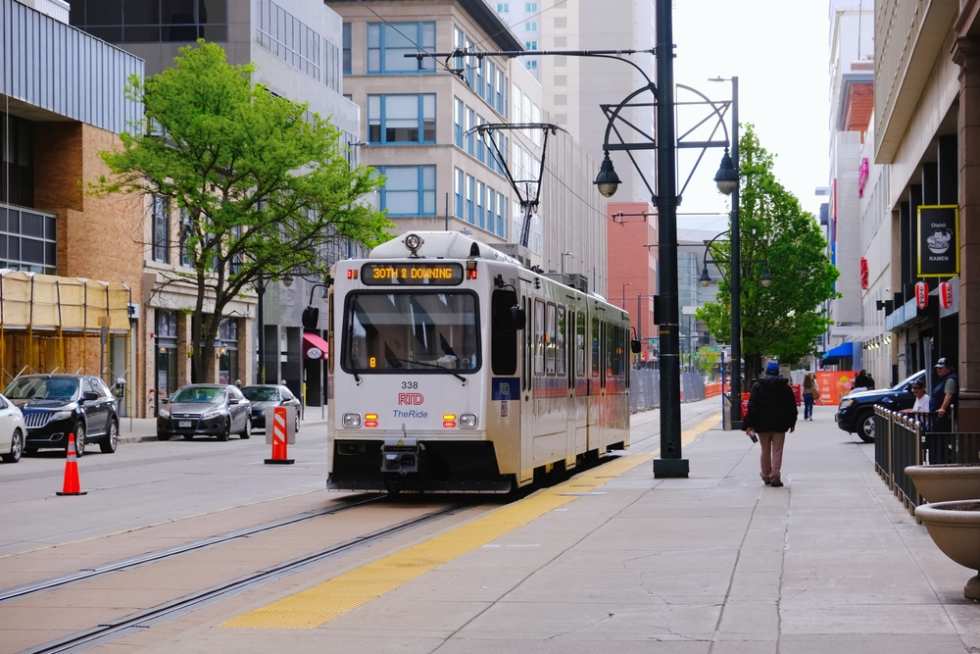- Contact for Availability
- Amenities
In unit laundry, Wine room, Patio / balcony, Granite counters, Hardwood floors, Dishwasher + more

The cost of living in Denver is 9% higher than the national average, which makes sense when you consider the fact that you get to take advantage of sunny skies most of the year, easy access to the Rockies, and a food and arts scene that keeps locals busy year-round. From early-morning hikes to late-night concerts, it’s a city where you can pack a lot into a single day.
Of course, all those perks come with a price tag. Denver’s cost of living is higher than the national average, particularly when it comes to housing. Still, it remains more attainable than coastal cities like San Francisco, Los Angeles, or Seattle, and wages here often stretch further thanks to lower taxes and fewer day-to-day expenses than those larger metros.
If you’re weighing a move, this guide will walk you through the numbers—covering rent, utilities, transportation, groceries, and other common expenses—so you’ll know exactly what it takes to make life in Denver work for your budget.
As one of the largest cities in the Mountain West, Denver carries higher living costs than many midsize metros, but it’s still more approachable than the most expensive U.S. markets. According to recent data from Apartment List and Best Places, Denver’s overall cost of living is roughly 27.6% higher than the national average, with housing as the biggest factor.
While the citywide median rent for a one-bedroom sits around $1,494, prices vary dramatically by neighborhood. Central areas such as LoDo, RiNo, and Capitol Hill tend to have the highest rents thanks to their walkable streets, entertainment, and proximity to major employers. More affordable options can be found in areas like Hampden South, Westwood, or Montbello, where rent often runs several hundred dollars less per month.
| Cost of Living | Denver | Colorado | U.S. |
|---|---|---|---|
| Overall | 127.6 | 120.5 | 100 |
| Grocery | 101.9 | 100.7 | 100 |
| Health | 83.9 | 83.8 | 100 |
| Housing | 183.1 | 167.5 | 100 |
| Median Home Cost | $576,000 | $527,200 | $291,700 |
| Utilities | 96.2 | 98.4 | 100 |
| Transportation | 116.1 | 106.7 | 100 |
| Miscellaneous | 152.2 | 120.4 | 100 |
Greenwood Village, just south of Denver, ranks among the priciest suburbs in the metro area. The cost of living here runs about 23.7% higher than the national average and roughly 2.7% higher than Colorado’s statewide average, driven by large single-family homes, luxury rentals, and proximity to major corporate offices in the Denver Tech Center.
Rental pricing for one-bedroom apartments in Greenwood Village average around $1,865.
| Cost of Living | Greenwood Village | Colorado | U.S. |
|---|---|---|---|
| Overall | 123.7 | 120.5 | 100 |
| Grocery | 105 | 100.7 | 100 |
| Health | 85.3 | 83.8 | 100 |
| Housing | 433.6 | 167.5 | 100 |
| Median Home Cost | $1,268,700 | $527,200 | $338,100 |
| Utilities | 96.5 | 98.4 | 100 |
| Transportation | 108.7 | 106.7 | 100 |
| Miscellaneous | 153.7 | 120.4 | 100 |
| Overall | 104.8 | 94.5 | 100 |
Greeley, located about an hour north of Denver, is one of the most affordable cities in the Front Range region. Overall living costs here sit roughly 13.4% above the national average, though nearly 5.9% below the Colorado state average, with housing prices playing the biggest role in keeping monthly expenses down.
Rental pricing for one-bedroom apartments in Greeley averages around $1,430.
| Cost of Living | Greeley | Colorado | U.S. |
|---|---|---|---|
| Overall | 113.4 | 120.5 | 100 |
| Grocery | 98 | 100.7 | 100 |
| Health | 87.2 | 83.8 | 100 |
| Housing | 126.8 | 167.5 | 100 |
| Median Home Cost | $420,600 | $527,200 | $338,100 |
| Utilities | 99.4 | 98.4 | 100 |
| Transportation | 88.3 | 106.7 | 100 |
| Miscellaneous | 110.3 | 120.4 | 100 |
As of August 2025, the median rent across all apartment sizes in Denver sits at $1,688, virtually unchanged from last month but 5.5% lower than a year ago. Breaking it down, a typical one-bedroom rents for $1,494, while a two-bedroom comes in at $1,861. These rates place Denver at #30 among the nation’s 100 largest cities for overall rent costs—about 20% higher than the U.S. average of $1,402.
This year’s rent dip follows a national cooling trend, though Denver’s decline has been steeper than both the state average (-4.7%) and the national average (-0.8%). While the pace of rent growth slowed, prices remain comparable to other mid-tier expensive markets such as Henderson, NV, and Scottsdale, AZ.
Within the Denver metro, the city’s median rent is 1.6% lower than the metro-wide figure of $1,716. Costs vary considerably by location. Highlands Ranch tops the chart at $2,359, while Englewood is currently the least expensive at $1,521. This spread means renters can find some relief by looking just outside city limits, especially in communities that remain connected to Denver by major highways and transit routes.
Denver Only:
| Bedroom | Median Price |
|---|---|
| Overall | $1,688 |
| One-Bedroom | $1,494 |
| Two-Bedrooms | $1,861 |
Across Colorado:
| City | Median One-Bedroom Rent | Median Two-Bedroom Rent |
|---|---|---|
| Aurora, CO | $1,308 | $1,655 |
| Lakewood, CO | $1,532 | $1,719 |
| Colorado Springs, CO | $1,138 | $1,332 |
As of August 2025, the average rent for a one-bedroom apartment in Denver is $1,494. Prices vary widely by neighborhood, apartments in high-demand areas like LoDo or RiNo often start above $1,900, while more budget-friendly options in neighborhoods such as Westwood or Montbello can be found closer to $1,200.
Location, building age, and amenities like parking, in-unit laundry, or fitness centers can all push prices higher.
| Area | Rent |
|---|---|
| Overall | $1,784 |
| LoDo | $2,134 |
| RiNo | $2,132 |
| Downtown | $934 |
As of August 2025, the average rent for a two-bedroom apartment in Denver is $2,354. Larger units in centrally located neighborhoods like Capitol Hill or Cherry Creek often start above $2,300, while more affordable areas such as Hampden South or Ruby Hill may list two-bedrooms closer to $1,500.
Factors like updated interiors, covered parking, and proximity to major employers can significantly influence monthly costs.
| Area | Rent |
|---|---|
| Overall | $2,354 |
| Capitol Hill | $1,875 |
| Cherry Creek | $3,533 |
| Ruby Hill | $1,198 |
While luxury properties in Denver can reach well into the millions, the median home price sits around $565,500 as of mid-2025. Compared to other large metro areas with similar amenities, Denver’s housing market remains more accessible than cities like Seattle or San Francisco.
For renters considering a future purchase, the city’s pricing trends and variety of neighborhoods provide potential entry points into homeownership, especially in areas just outside the downtown core where prices tend to be lower.
A common guideline for budgeting rent is the 30% rule, which suggests keeping housing costs at or below 30% of your gross income. With Denver’s median overall rent at $1,688 as of August 2025, you’d need to earn about $67,520 per year (or roughly $5,627 per month, $32.46 per hour) to comfortably afford that amount without stretching your budget.
According to the website Data USA, the median household income in Denver is about $91,681, which is well above the income needed to rent at the median price point. That gap means many households could afford average rent while still having room for other expenses. For comparison, the U.S. median household income is about $75,149, making Denver’s median income notably higher than the national figure.
For a broader view of essential costs, the MIT Living Wage Calculator estimates that a single adult in the Denver metro needs $47,913 annually to cover the bare necessities, like housing, food, and healthcare, without factoring in savings, debt repayment, or discretionary spending.
If you want to pinpoint the rent range that works best for your own situation, our Apartment List Rent Calculator can help you find apartments that fit your budget and lifestyle.

Transportation costs in Denver can vary widely depending on whether you rely on a personal vehicle or make use of the city’s public transit system. According to the MIT Living Wage Calculator, a single adult in the Denver metro spends about $8,067 annually (roughly $672.25 per month) on transportation, while a household with two working adults and two children averages $13,532 annually ($1,127.67 per month).
Denver is still primarily a driving city, and traffic can be a factor during rush hours, especially along I-25, I-70, and C-470. The Walk Score for Denver is 69 (somewhat walkable), the transit score is 54, and the bike score is 95. While many neighborhoods require a car for daily errands, areas like Capitol Hill, LoDo, and Uptown make it easier to get around using RTD buses, light rail, and rideshares.
If you’re looking to reduce car dependence, neighborhoods near light rail stations or central bus corridors can help cut commuting costs, though rents in those areas may be higher. For most residents, budgeting for gas, insurance, parking, and occasional transit fares is an essential part of living in Denver.
Grocery spending in Denver will depend on your household size and eating habits. According to the MIT Living Wage Calculator, a single adult in the Denver metro spends about $4,861 annually ($405.08 per month) on food, while a family with two working adults and two children averages $14,249 annually ($1,187.67 per month).
Dining out can raise that total quickly.
Based on Numbeo’s latest data, a meal at an inexpensive restaurant in Denver averages $20, while a three-course meal for two at a mid-range restaurant costs around $80.
Coffee runs, craft beer, and takeout, especially from Denver’s growing food truck scene, can add up if they’re part of your weekly routine.
Local favorites range from green chili-smothered burritos to bison burgers and farm-to-table fare. While eating out is part of the city’s culture, those who cook at home more often will keep food spending closer to MIT’s estimates, freeing up budget for other expenses.
Child care is one of the largest expenses for families in Denver. According to the MIT Living Wage Calculator, annual costs average about $21,348 for one child and $40,278 for two children in the metro area. These figures cover full-time care and can vary depending on the type of program, the child’s age, and location within the city.
To help manage costs, some parents coordinate remote work schedules to reduce the number of paid care hours, explore in-home care options, or look for providers in more affordable neighborhoods where rates and waitlists may be lower. Cooperative child care arrangements with other families can also be a way to keep expenses in check while maintaining quality care.
Healthcare costs in Denver average about $3,006 per year ($250.50 per month) for a single adult, according to the MIT Living Wage Calculator. For a family with two working adults and two children, that figure rises to roughly $8,198 annually ($683.16 per month). The higher cost for families reflects the added expense of pediatric care, family health plans, and increased medical service usage.
According to Numbeo, the average monthly cost for basic utilities in Denver, including electricity, heating, cooling, water, and garbage service, is about $177.72, below the national average of roughly $209.47. High-speed internet runs around $65.85 per month, while a typical mobile phone plan averages $50–$60.
Denver’s four-season climate can cause utility bills to swing throughout the year. Air conditioning use drives costs higher in July and August, while heating expenses climb in late fall and winter. Renters and homeowners should plan for these fluctuations, adding extra room in the budget during the hottest and coldest months.

Denver’s location at the edge of the Rocky Mountains makes it a playground for active residents year-round. Locals have easy access to city parks like Washington Park and City Park, hundreds of miles of urban trails, and quick getaways to hiking, skiing, and snowshoeing in the nearby foothills. Closer to home, the Cherry Creek and South Platte River trails offer scenic routes for running, biking, or casual walks.
According to Numbeo, a standard gym membership in Denver averages about $64.45 per month, which is on par with other cities of similar size. Many apartment communities include fitness centers in the rent, and home gym setups can be a cost-effective alternative over time for those who prefer to work out privately.
Entertainment costs vary but are generally reasonable. A movie ticket averages around $15, and there’s no shortage of free or low-cost options, like visiting Red Rocks Park, exploring local art districts during First Friday events, or catching a community concert at Civic Center Park. For budget-conscious residents, Denver makes it easy to stay active and entertained without overspending.
Denver’s combined sales tax rate is 8.81%, which includes Colorado’s state sales tax of 2.9%, Denver County’s 4.81%, and an additional 1.1% in special district taxes, according to the Tax Foundation. Colorado has a flat state income tax rate of 4.4%, meaning all earners pay the same percentage regardless of income level.
While property taxes in Colorado are relatively low compared to other states, sales and income taxes still factor into Denver’s higher-than-average cost of living. For most households, these recurring expenses can have as much impact on the budget as utilities or transportation, especially when combined with housing costs.
Denver’s economy has grown steadily over the past decade, driven by sectors like technology, healthcare, aerospace, energy, and professional services. Major employers in the area include UCHealth, Centura Health, Lockheed Martin, Ball Aerospace, and a range of tech companies clustered around the Denver Tech Center. The city’s unemployment rate typically trends below the national average, reflecting its strong and varied employment base.
Remote and hybrid work opportunities have also expanded in Denver, attracting professionals who value the area’s lifestyle and access to both urban and outdoor amenities. While salaries can be competitive, particularly in high-demand fields like software development, engineering, and healthcare, housing and transportation costs should still be factored in when evaluating job offers.
Denver’s mix of career opportunities, cultural events, and easy access to the Rockies makes it an appealing place to live, whether you’re relocating from across the country or just moving to a new neighborhood.
From lively downtown districts to quieter residential areas, the city offers options for a wide range of budgets and lifestyles.
Ready to start your Denver apartment search? Use Apartment List to find rentals that fit your needs, whether you’re looking for a modern loft near LoDo, a budget-friendly unit in Westwood, or something in between.
As of August 2025, the median rent in Denver is $1,688 across all apartment sizes. A typical one-bedroom rents for $1,494, while a two-bedroom averages $1,861. These prices are about 20% higher than the national median rent.
The most affordable option citywide is a one-bedroom apartment, with a median price of $1,494. Prices can drop significantly in certain neighborhoods, such as Westwood or Montbello, where one-bedroom units often list closer to $1,200.
If you rent the city’s median-priced one-bedroom at $1,494, your annual rent would total about $17,928. Adding in average yearly costs for groceries ($4,861), healthcare ($3,006), and transportation ($8,067) brings total basic living expenses to roughly $32,862 per year, before factoring in utilities, childcare, or other personal expenses.
According to Data USA, Denver’s population is about 713,734 as of 2023 estimates. Colorado’s total population is approximately 5.9 million.
Using the 30% rule for housing costs, you’d need to earn about $67,520 per year to comfortably afford the median overall rent of $1,688. Data USA reports Denver’s median household income at $91,681, which is higher than both the national median income ($75,149) and the salary needed to rent comfortably.



In unit laundry, Wine room, Patio / balcony, Granite counters, Hardwood floors, Dishwasher + more
In unit laundry, Hardwood floors, Pet friendly, Stainless steel, Gym, Pool + more